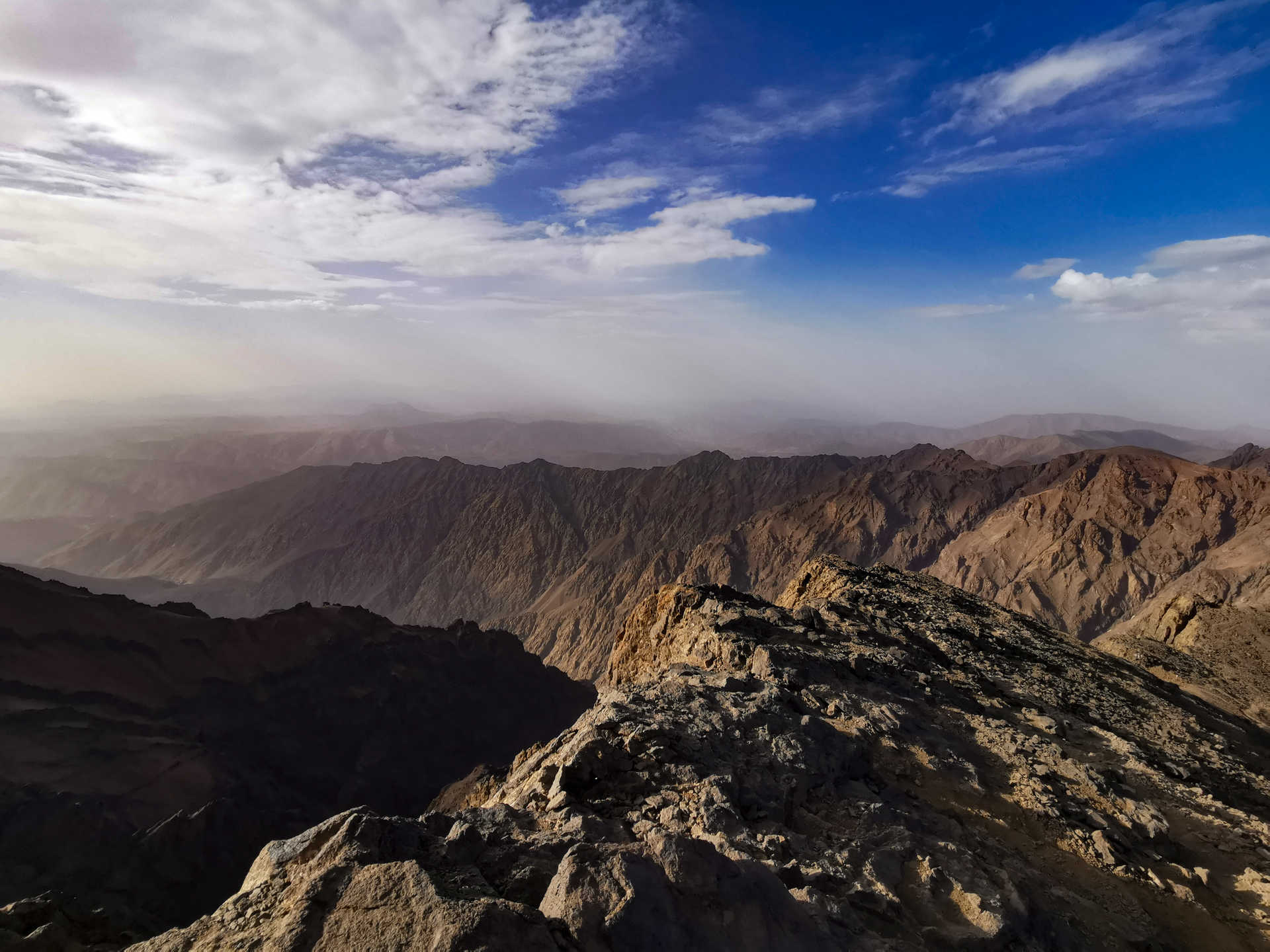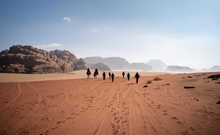Mount Toubkal The Short Way
- Kandoo Trekking

Contact
our UK team

Arrive in Marrakesh and transfer to your hotel. After clearing immigration and collecting your luggage, exit the arrivals building and look out for one of our team holding a KANDOO sign. If you wish to exchange money in the airport make sure you do this before leaving the building. Transfer to your hotel and have the rest of the day free to explore Marrakesh. Your pre-trek briefing will take place at 7pm this evening in the hotel foyer, here you will meet your guide and gain an in depth understanding of the trek you are about to embark on.
This morning we set off early from the hotel, boarding our transfer and heading up the winding roads to Imlil. Taking in the relaxed atmosphere in this mountain town, we set off on a well worn track up to the Nelter refuge, nestled at the base of Toubkal. We pass local women, draped in exquisite outfits, riding mules led by well dressed Berber men, heading up to Sidi Chamarouch - a fertility shrine perched by the river that weaves it's way down the valley. At the top of the valley looms our target; the rugged peak of Toubkal. On arrival at the refuge, we get set up in camp before enjoying some freshly prepared, local cuisine. An early night is needed in preparation for the next day's summit attempt.
The big day! We will leave early (around 5am), climbing a steep, rocky ascent up the mountain side to reach a hanging valley known as the South Cwm where huge boulders are scattered around the track. We continue up scree slopes to hit the summit ridge at 3940m and follow the exposed path, traversing the crest of the ridge to the summit pyramid at 4167m. We are now standing on the highest point in North Africa and the sense of achievement is enormous! The deep valleys of the Atlas Mountains are laid out below, layer upon layer of rust coloured ridgeline separating them. We descend back down the loose scree to the refuge, have a much needed lunch break, then continue down the valley to the village of Aremd (1900m), stopping at Sidi Chamarouch for a break. Our feet are feeling it by the time we arrive at our Moroccan style guesthouse. Here we say goodbye to our mule handlers and settle into our accommodation, making the most of a hot shower and a comfortable bed.
After breakfast, we leave our bags with a small transfer vehicle and walk to the road head at Imlil, where our larger transfer bus will take us to Marrakesh. We will arrive in the late morning and check in to our hotel. We then have a free day to soak up all the fascinating sights of Marrakesh...visit the Majorelle Garden, Bahia Palace and the world famous web of souks stretching out from the Jamaa El F’na market. A tour with an English speaking guide can be arranged.
Transfer to the airport and flight home.
Make sure you have experience of walking for up to 6 hours a
day, for several days in a row, on uneven ground. The trail will vary
from well trodden paths to very steep, rocky and sometimes loose terrain. At
times the path crosses exposed, steep mountainside so make sure you feel
comfortable on this type of terrain. There will also be changes of
altitude as you climb above 3000m which may affect the way your body
feels. A good amount of endurance is necessary but mental
stamina is the most important thing.
This programme does not require any technical climbing
ability or experience but you should be in the best physical condition possible
before departure. Take a look at our Morocco Training Guide for tips on how to prepare for
your climb.
You will be accompanied by a qualified Berber guide at all
times as well as your cook and mule drivers who will meet you at camp/your
accommodation each evening. As well as hiking you will assist the team
with packing away and putting up tents. On this trip, you are part of the team
and must do your share of the work. Although this makes the adventure a little
more demanding, it also adds to the enormous sense of satisfaction and
achievement at the end of your journey.
If you have any questions about your suitability or how to
prepare for this trip please do not hesitate to contact us.
Evening meals will always be made up of delicious
Moroccan cuisine prepared with locally sourced ingredients.
There will normally be a soup starter followed by a tagine or stew with salad,
couscous or pasta and bread. We can provide vegetarian, vegan or gluten
free meals on request. If you have special dietary requirements
please let us know when booking your trip.
In Marrakesh, at the start and end of your trip, you can
purchase meals at the hotel or head out in to the city to find a
restaurant. Less than a 5 minute walk from the hotel you will find Bd
Moulay Rachid, a street with a wide range of international and local options
and you will find most dietary requirements are catered for. Restaurants with
international options such as pizza and burgers, French and local cuisine, or
if you are wanting something lighter then look for the roadside cafes offering
the locals favourite, Omelette Khaali (lamb omelette) and Mint Tea.
Drinks are not included in the cost of your trip. You
will need to bring a water purification filter or tablets and
a water bottle or flask for your trip. During your trek you can refill
your water at natural springs, in villages and at the refuge below
Toubkal. On some days you may not pass a shop as the trek goes through
remote valleys and many of the shops are in small villages or settlements and
therefore may close without warning. Please ensure you are able to purify
natural water safely, rather than relying on buying bottled water; we also do
not recommend acquiring single-use, plastic water bottles as these must be
carried out and recycled.
We provide a good quality 3 man tent. They are designed to sleep three people, but we only ever sleep 2 to a tent, to ensure you have plenty of space for you and your gear. Keep in mind, these are proper mountain tents, designed to cope with extreme conditions so don’t expect to be able to stand up and walk around inside! A foam mattress per person will also be provided. You will be required to assist with pitching your own tent at the end of each day.
Other Accommodation
In Marrakesh you will be staying in a comfortable 3 star hotel in an en-suite twin or double room. WiFi is available at the hotel and it also has a swimming pool, hammam (spa) and restaurant.
Lost / delayed luggage:
We recommend that you wear your walking boots to travel and pack as many essential items as possible in your carry-on luggage. If your luggage is delayed we can then do our best to kit you out to start the trek on time. In the event that your luggage is delayed or lost, our procedure is as follows:
Establish what items are missing and a contingency plan for each critical item
If it reaches 6pm on the evening before starting the trek and your luggage has not arrived we recommend buying and/or hiring items immediately as a precaution
We will take you to a shop where you can buy toiletry items, e.g. toothbrush. You will be able to find everything you need in Marrakesh.
We will do everything we can to help if your luggage is lost or delayed. Be sure to check your insurance policy coverage for lost luggage cover.
A pre-trek briefing will be held at 7pm on the evening of Day 1 in your hotel foyer in Marrakesh and we strongly recommend that you book a flight that arrives in time for you to attend the briefing. If you should arrive on a later flight, you will be given the full briefing the next morning before you set off on your trek.
Guide: 100-160 MAD ($10-15)
Cook: 85-110 MAD ($8-10)
Mule drivers: 160-210 MAD ($15-20) - amount per driver (depending on your group size you may have between 3-5 mules and drivers)
| From | To | Price | Availability | Book | Enquire |
|---|---|---|---|---|---|
| 07/06/2025 | 11/06/2025 | £529 $689 |
Guaranteed
|
Book now | Enquire now |
| 05/07/2025 | 09/07/2025 | £529 $689 |
Available
|
Book now | Enquire now |
| 02/08/2025 | 06/08/2025 | £529 $689 |
Available
|
Book now | Enquire now |
| 13/09/2025 | 17/09/2025 | £529 $689 |
Available
|
Book now | Enquire now |
| 06/06/2026 | 10/06/2026 | £629 $819 |
Available
|
Book now | Enquire now |
| 04/07/2026 | 08/07/2026 | £629 $819 |
Available
|
Book now | Enquire now |
| 01/08/2026 | 05/08/2026 | £629 $819 |
Available
|
Book now | Enquire now |
| 12/09/2026 | 16/09/2026 | £629 $819 |
Available
|
Book now | Enquire now |
Want to ask us a question or book a private trip? Don't hesitate to contact us!
Contact us